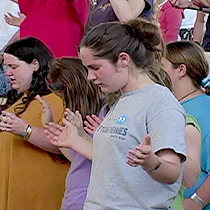-
(单词翻译:双击或拖选)
Washington, D.C.
21 June 2007
A fast-growing religious movement in the U.S. says violent media messages are responsible for most of today's troubles with young people, and its followers1 see God as the only solution. Producer Zulima Palacio talked to some of the group's members, as well as to a variety of experts who see other causes for violent behavior among the young. Jeffrey Young narrates2 the story.
| A Teen Mania concert |
Every month somewhere in the U.S., thousands of young people are drawn4 to the call of music. Teens love it. It is loud and fun and they can dance.
But this is not a typical rock concert. It is Christian5 music, and it includes prayers and multiple references to God. The concerts and many other youth activities are organized by a group called "Teen Mania." It is part of a national campaign driven by evangelicals and conservative Christians6 who say that this generation is under attack by a culture of drugs, sex and violence, mostly promoted by the media.
Reverend Ron Luce is the president and founder7 of "Teen Mania." "What young people are being assaulted with right now, no other generation has ever been assaulted with,” says Luce. “They are being hammered and destroyed by the culture, the garbage from New York, Hollywood, music world, MTV, they're being destroyed, so this is a battle."
Luce says that about 200,000 teens from 60 different Christian denominations8 have joined his group's youth activities. He says they reject violent media messages and support the study of the Bible as a solution.
 |
| Teens attend a Christian concert |
Some of Luce's young followers expressed their commitment to God as the only real solution to what they say are today's heavy messages celebrating drugs, sex and violence.
"I think that teenagers should do sports and do a lot of extracurricular activities and all that stuff, but honestly, [it's now too much]” says a citizen. “God alone is going to give you that sense of worth, that real joy and just life."
Many people believe that media messages can influence young minds, but they also say there are other factors involved. The U.S. Congress created the Hamilton Fish Institute to study school and community violence. Beverly Glenn is its director.
 |
| Hamilton Fish Institute director Beverly Glenn |
Glenn says that millions of young people watch TV and play violent video games daily but never show signs of violent behavior.
"This is almost the first generation of young people who have had unfiltered messages to the kinds of things that only adults get to hear and see,” adds Glenn. “I think young people are doing very well, because most people are not mass murderers.”
Glenn says that many studies have shown what works well to keep young people out of trouble and away from violence -- things like small schools, academic achievement, sports, arts and music. She says religious activities are not the only solution.
"If religious organizations are really engaged in youth development, no proselytizing12, but youth development support, that works to develop young people."
Many say that knowing what triggers violent behavior is a complex question. Dr. Paramjit Joshi chairs the Department of Psychiatry13 at Children's Hospital in Washington, D.C.
"Many people who commit mass murder may have a mental illness, but I am sure there are some who don't and it is just an act of violence with no regard for the other person,” says Dr. Joshi. "We know that the rate of violence is increasing, especially in the U.S. There are many factors and media is just one piece of it. There is access to fire arms, frustration14 among the youth and many psycho-social factors."
While the followers of the "Teen Mania" movement see God as the answer to all questions, when it comes to specifics of youth violence, Dr. Joshi and Beverly Caffee Glenn agree there are many reasons, and many causes. They also concede there are still many questions, but few answers.
 收听单词发音
收听单词发音
1
followers

|
|
| 追随者( follower的名词复数 ); 用户; 契据的附面; 从动件 | |
参考例句: |
|
|
|
2
narrates

|
|
| v.故事( narrate的第三人称单数 ) | |
参考例句: |
|
|
|
3
mania

|
|
| n.疯狂;躁狂症,狂热,癖好 | |
参考例句: |
|
|
|
4
drawn

|
|
| v.拖,拉,拔出;adj.憔悴的,紧张的 | |
参考例句: |
|
|
|
5
Christian

|
|
| adj.基督教徒的;n.基督教徒 | |
参考例句: |
|
|
|
6
Christians

|
|
| n.基督教徒( Christian的名词复数 ) | |
参考例句: |
|
|
|
7
Founder

|
|
| n.创始者,缔造者 | |
参考例句: |
|
|
|
8
denominations

|
|
| n.宗派( denomination的名词复数 );教派;面额;名称 | |
参考例句: |
|
|
|
9
passionately

|
|
| ad.热烈地,激烈地 | |
参考例句: |
|
|
|
10
fervently

|
|
| adv.热烈地,热情地,强烈地 | |
参考例句: |
|
|
|
11
ministry

|
|
| n.(政府的)部;牧师 | |
参考例句: |
|
|
|
12
proselytizing

|
|
| v.(使)改变宗教信仰[政治信仰、意见等],使变节( proselytize的现在分词 ) | |
参考例句: |
|
|
|
|
13
psychiatry

|
|
| n.精神病学,精神病疗法 | |
参考例句: |
|
|
|
14
frustration

|
|
| n.挫折,失败,失效,落空 | |
参考例句: |
|
|
|















